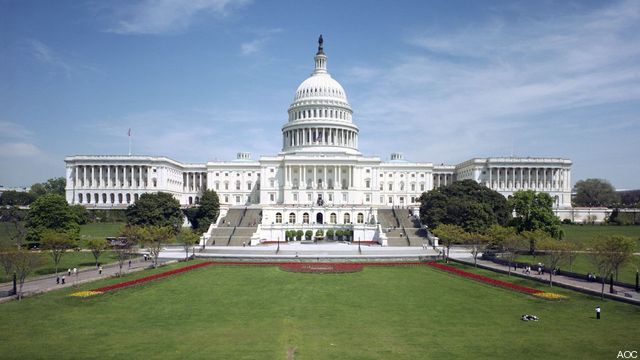AIA Keeps Slugging Away At Sequestration; Blakey Distances Group From Tax Rate Boost
Posted on
 WASHINGTON: Sequestration, sequestration, sequestration — that was the one note the Aerospace Industries Association struck over and over at its biggest annual public event.
WASHINGTON: Sequestration, sequestration, sequestration — that was the one note the Aerospace Industries Association struck over and over at its biggest annual public event.
Flanked by AIA’s now-iconic clock counting down 27 days before the sequester destroys “two million jobs” (a disputed figure), President Marion Blakey declared: “I’m an optimist and we have to prevail.” But with automatic budget cuts slated to take effect Jan. 2, unless Congress and the White House reach an increasingly unlikely deal, just how forestalling the sequester isn’t entirely clear. Nor did Blakey endorse the bold proposal of one of its member CEOs to raise corporate and individual tax rates as part of a deal.
[Ironically, in its fixation on sequestration, AIA deliberately downplayed some good news about the industry: click here for more.]
So thoroughly did sequestration dominate the agenda that even AIA’s slickly produced video presentation eschewed the normal bombast over America’s superior air- and spacecraft to warn of the danger of the automatic budget cuts. Blakey got right to it.
“Let me get right to it by making a few comments about the fiscal cliff,” Blakey began, right after her opening pleasantries. “On Monday more than a hundred of our [member companies] sent a letter to President Obama and the Congress urging them to work together…and adopt a balanced approach to the country’s long-term fiscal challenges.”
Also on Monday, AIA had organized an event with four CEOs at the National Press Club, at which two of them — Northrop Grumman‘s Wes Bush and TASC s David Langstaff — surprised industry watchers by admitting that further cuts to defense spending were politically inevitable as part of any stop-sequestration deal. Langstaff even argued for increases in marginal tax rates, something Republicans have refused to accept.
Asked today by Breaking Defense if Langstaff and Bush were expressing a new AIA position or breaking ranks, Blakey dodged that Morton’s Fork by saying, essentially, neither:
“No, they weren’t breaking ranks at all. They were being very, very consistent with what we are advancing and truly believe, and that is what we do have to have a balanced solution,” Blakey said. “Everything on the table, we believe, is the way to get there.
“Part of the solution is tax reform as well as entitlement reform — now that’s a word you don’t hear very often in all of this — but they were advocating both of those things,” she went on. (Democrats have been as skittish about cutting Medicare, Medicaid and Social Security as Republicans have been about raising taxes).
Blakey did throw some cold water on the concept of increasing marginal tax rates, as opposed to raising tax revenue by various “reforms” such as closing loopholes, which Republicans would prefer. “Remember, one of the things that’s holding the United States back as much as anything else is our corporate tax rates,” she said. (The US corporate rate is 35 percent, or 39.2 percent counting average state and local taxes, compared to an average of 23.6 percent across the 35-nation Organization for Economic Cooperation and Development, the OECD).
The CEOs on Monday did discuss “the idea of an increase on personal tax rates and another one percent [on] corporate tax rates,” Blakey said, but they did so as “strong individuals” — that is, not as spokesmen for AIA. “You’d like to see reform across the board and I think that’s got to be part of any solution we see,” Blakey said. “Certainly individuals have different variations on that.”
Former Administrator of the Federal Aviation Administration, Blakey took care to emphasize the impact of sequestration’s “massive” $1 billion bite out of the FAA, which she said would hamper everything from airline schedules to the ambitious Next Generation Air Transportation System, “NextGen,” to the integration of unmanned drones into civilian airspace. She also highlighted the potential damage to the obscure but vital National Oceanic and Atmospheric Administration, whose polar-orbiting weather satellites were essential to predicting the path of Hurricane Sandy in time for people to evacuate but which will soon require replacement.
Indeed, Blakey spent more time on the comparatively tiny FAA and NOAA than on the massive Defense Department. Perhaps she did so in hopes of driving her point home to a wider audience, the everyday Americans who don’t work in or pay much attention to national security (and who usually don’t read this site) but who do check the weather every day and fly to see their families for the holidays.
“We’re counting on the fact that lawmakers will do the rational thing,” Blakey said as she wrapped up her remarks. “Good luck to us all.”
Subscribe to our newsletter
Promotions, new products and sales. Directly to your inbox.
